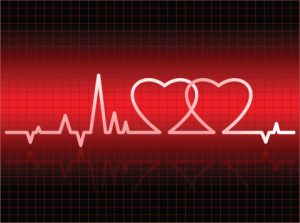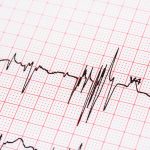 You may notice that your heart races at night or you experience more frequent heart palpitations. For some, this may actually be an all-day occurrence which is overlooked because you are just too busy during the day to notice. But by the time you relax at night, these symptoms become more apparent. Other people may actually experience changes in heart rate only at night or while falling asleep. So, what is going on exactly?
You may notice that your heart races at night or you experience more frequent heart palpitations. For some, this may actually be an all-day occurrence which is overlooked because you are just too busy during the day to notice. But by the time you relax at night, these symptoms become more apparent. Other people may actually experience changes in heart rate only at night or while falling asleep. So, what is going on exactly?
In a healthy adult, the heart rate should average between 60 and 100 beats per minute. Factors that determine heart rate are activity level, exertion of the body, and even stress levels. Throughout the day, our heartbeats may quicken or slow down. This is known as heart palpitations.
Advertisement
Heart palpitations can be harmless and merely a response to activity, stress, etc. But in some cases, they can be the sign of a serious condition. When it comes to matters of the heart, it’s best to be on guard to help prevent any serious illness.
10 Common Causes of heart racing at night
Nightmares or night terrors: A nightmare or night terror can be a scary occurrence. As a dream gets scarier it can increase your heart rate. Although many people may not remember their dreams or nightmares, they may wake up in a cold sweat or breathing heavily.
Emotional triggers: Anxiety, stress, or excitement can increase heart rate as there is a release of adrenaline in the body.
Hormonal changes during period, pregnancy, and menopause: Hormonal changes occur during a woman’s period, pregnancy, and menopause. These hormone fluctuations can cause the heart rate to speed up. As these changes are natural occurrences, in this case speeding up in the heart rate isn’t much to worry about.
Certain medications or substances: A side effect of certain medications can be heart palpitations. Many blood pressure and asthma medications can lead to a racing heart rate, especially if they are taken at night. Other substances that increase heart rate include spicy foods, alcohol, caffeine, nicotine, and recreational drugs.
Low blood pressure: Blood pressure usually lowers at rest, but if it is too low your heart rate will speed up to compensate.
Low blood sugar levels: Heart palpitations as a result of low blood sugar levels can be dangerous, as it can signify a complication. Other symptoms include dizziness, confusion, and shakiness. If blood sugar is not restored, the person may even faint. Low blood sugar levels can be due to exercise, a skipped meal, or too much insulin.
Heart disease: Heart racing at night could be a symptom of heart disease and may be associated with coronary artery disease or a previous heart attack or other problems with the heart muscle or valves.
Other health conditions: Hyperthyroidism (overactive thyroid), diabetes, anemia, high fever, and dehydration
Treatment options to deal with heart racing at night
 Treatment options to deal with heart racing at night focuses on targeting the underlying cause. You should seek immediate medical attention if you also notice chest pain and discomfort, fainting, severe dizziness, and sudden shortness of breath.
Treatment options to deal with heart racing at night focuses on targeting the underlying cause. You should seek immediate medical attention if you also notice chest pain and discomfort, fainting, severe dizziness, and sudden shortness of breath.
Medications can help relieve heart racing at night or you may have to change medications you are taking if they are the cause.
If your nighttime heart racing is triggered by emotions, you will want to find ways to combat your anxiety or stress. You should also avoid substances and activities that can trigger heart racing prior to bed. This includes strenuous exercise, smoking, drinking alcohol, or eating too late at night.
If you’re concerned that your heart racing at night is caused by a more serious health condition, you will want to book an appointment with your doctor to get properly diagnosed. After identifying the exact cause, your doctor can recommend you a specific treatment for your condition.
Lifestyle changes for heart palpitation at night
Seeing your doctor will always be the best course of action when treating the symptoms of heart palpations. However if there is an underlying pathological cause, performing the lifestyle changes may provide some relief.
- Avoid the use of illegal drugs, such as marijuana, cocaine, etc., as they can lead to heart palpitations
- Avoid the consumption of caffeine, nicotine, alcohol, and stimulate medication as they may boost heart rate
- Ensure you are getting adequate amounts of sleep every night
- Consider performing meditation to reduce stress and anxiety
- It is a good idea to note the events leading up to heart palpitations, as well as the timings and frequency to better narrow down why they may occur
Advertisement
Additionally, the following are some temporary techniques that may help slow down the heart for a while. It is important to note that these are not treatments for a racing heartbeat but techniques that should only be done in a safe setting. If your heart palpitations are at a critical level, going straight to the hospital is highly recommended.
- Valsalva maneuver: Performed by making sure your mouth is closed and pinching your nose as you attempt to breathe through it. This works by stimulating the vagus nerve, which can affect heart rate.
- Deep breathing exercises: By breathing at a regulated pace, you can decrease your heart rate. Try taking a deep breath for five full seconds and then breathing out for another five full seconds.
- Exercise: One of the best methods to slow down the heart rate over the long term, which can help regulate the occurrence of heart palpitations. However, you should consult with your doctor about what level of exercise is right for you.
By practicing a daily routine of healthy habits, you can lower your risk of experiencing heart palpitations. It is important to keep in mind that despite having some control over your heart health, only by visiting a doctor will you be able to fully assess how much you are at risk for developing heart rate issues.
Related: How to treat ischemic cardiomyopathy? Causes, symptoms, and prognosis
